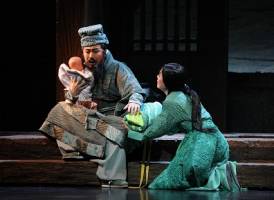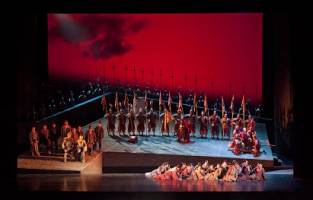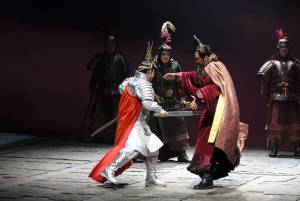Chinese Orphan (Zhaoshi guer)
Genre: Western opera
Produced by National Centre for the Performing Arts, China
Composer: Lei Lei
Script: Zou Jingzhi
Director: Chen Xinyi
Performers: Yuan Chenye, Chen Yong, Yao Hong, Liang Ning, Guan Zhijing
About the genre
We use song-dance theatre to refer to the traditional/indigenous theatre in China (that has often been referred to as “Chinese opera”), because there is indeed the performing genre “opera” in the country. 〔LINK About the pilot 〕The emergence of opera in China was inspired by the introduction of Western opera during the New Culture Movement (1916-1920s). Its musical composition typically follows Western musical structure and harmonic principles while the melodies are strongly influenced by traditional theatre and folk music.
Chinese composers started working on operas as early as the 1920s, among the first pieces were children’s song and dance dramas including Sparrows and Children (Maque yu xiaohai) and others composed by Li Jinhui (1891-1967).
Chinese opera houses also produce Western operatic repertoire.
Scenario:
The Orphan of Zhao is a play based on historical records. [Link to the Exhibition] The orphan was born circa 583 BC during the Spring-Autumn Period – a time when imperial power was being eroded by the growth of numerous aristocratic-family-states. Appalled by the chaos and bloodshed, philosophers such as Confucius (551-479 BC) acted as advisors to rulers on how to control their states and people.
Historical records present contradictory accounts of the story. Most versions of different theatrical genres and films we see now are based on the extant full-length tragedy Wrongs Avenged by the Orphan of Zhao by Ji Junxiang, written in the Yuan dynasty when China was ruled by the Mongols (1279-1368 AD).
The basic story is as follows: schemed by the evil courtier Tu’an Gu, the Zhao clan were all killed except for the Princess who was the Jin Ruler’s sister and was pregnant. After the baby was born, he was smuggled out by a doctor called Cheng Ying. Having realized that the baby boy had escaped, Tu’an Gu gave the order to kill all the newly born boys in the country. Finally, Cheng Ying decided to give up his own child for the Zhao orphan. Meanwhile Cheng Ying and his friend, a retired minister Gongsun Chujiu made a plan. Cheng would report to Tu’an about Gongsun who had the Zhao orphan in his house. Actually the real Zhao orphan was hidden in the deep mountain while Cheng’s own baby son was with Gongsun. Tu’an killed both Gongsun and the child. In order to reward Cheng Ying as a loyal reporter, Tu’an took both Cheng Ying and his son (but actually Zhao’s offspring) to his house and Tu’an made himself the foster father of the boy.16 years later, Cheng Ying revealed the true story to the young man. The orphan of Zhao took the revenge on Tu’an, for his parents, grandparents, his clan and for Cheng Ying. In order to rescue this orphan many people died.
This is an archetypal Chinese story of loyalty, honesty, sacrifice, friendship, evil, revenge, bravery, and justice.
There are two clips. One is from the scene when Cheng Ying, the doctor, brings back the orphan of Zhao, smuggled out of the palace by him. Faced with two babies, Cheng Ying’s wife gradually understands her husband’s decision. She is devastated. There is also a trailer of the production that China’s National Centre for the Performing Arts made for the Leeds international symposium Performing China on the Global Stage, held in March 2013.
Images and the video are courtesy of National Centre for the Performing Arts, China.
《赵氏孤儿》
剧种:歌剧
演出单位:中国国家大剧院,2011年
作曲:雷雷
编剧:邹静之
导演:陈薪伊
演员:袁晨野、陈勇、么红,梁宁、关致京
剧种简介:
国际研究互联网项目“舞台中国”从不使用“Chinese opera”这个英文词来表达中国戏曲,因为在中国戏剧的大家庭里,确实存在歌剧(opera)这个形式。〔LINK 关于实验版本的说明〕 受到1916-1920年代新文化运动的影响,西洋歌剧进入了中国,中国音乐实践者也开始创作自己的歌剧。歌剧的作曲严格按照西洋歌剧以及和声的各种规则,同时,在旋律方面也吸取中国戏曲、民歌和小调的养分。
早在20世纪20年代,中国作曲家就开始写作中国歌剧,早期作品包括为儿童写的歌舞剧,如黎锦晖(1891-1967)创作的《麻雀与小孩》就是非常成功的作品。
中国各地歌剧院也都演出西洋经典歌剧作品。
剧情简介:
《赵氏孤儿》是一个春秋时代的故事。〔LINK 展览〕。据史书记载,孤儿出生于公元前583年左右。当时受到“分封制”诸侯日益强大势力的侵蚀,周王权日益衰微,诸侯争霸称雄,战争与血腥屠杀连年不断。同时,诸子百家学说开始出现,并试图就如何管理国家和人民等等给予统治者以哲学性的思考。
史书有着互相矛盾的关于赵氏孤儿的记载。我们现在所看到的各种戏剧形式和电影版本基本上来自于元代纪君祥的《冤报冤赵氏孤儿》。
大致故事如下:奸臣屠岸贾设计将与自己不和的赵氏家族满门抄斩,唯一幸免的是已有身孕的、赵朔的妻子庄姬,她是晋王室的公主。男婴出生以后,就被一位叫作程婴的医生想办法带出了宫苑。当屠岸贾听说婴儿已经逃遁,便下令杀死举国上下所有在这段时期内出生的男婴。几经考量,程婴决定献出自己的亲生儿子以保全赵家唯一的骨血。与此同时,程婴和老友、已经告老还家的公孙杵臼安排了救孤的计划。程婴前往屠岸贾处报告公孙杵臼藏匿了赵氏的孤儿,而实际上,真正赵家的孤儿被藏在深山之中,而公孙那里的男婴恰恰是程婴自己的孩子。屠岸贾杀死了公孙杵臼和婴儿,为报答程婴举报之功,他把程婴及其儿子(是真正的赵氏孤儿)接回自己家里,好生款待,并把男孩作为自己的养子来呵护养育。孤儿长大成人以后,程婴将孤儿的身世告诉了他本人。为给自己的父母、祖父母、赵氏家族以及为程婴报仇,孤儿杀死了屠岸贾。为了拯救孤儿,诸多英雄献出自己的生命。
实验版本收有两个歌剧《赵氏孤儿》的片断。第一个是程婴带着赵氏孤儿回到家里。面对着两个孤儿,程婴的妻子渐渐明白了丈夫的决心。她心痛欲绝。第二个是中国国家大剧院在2013年为国际研究互联网项目“舞台中国”召开国际会议“寰球演出中国”时专门制作的有关该剧演出的短片。
诚挚感谢中国国家大剧院提供图片与录像。


